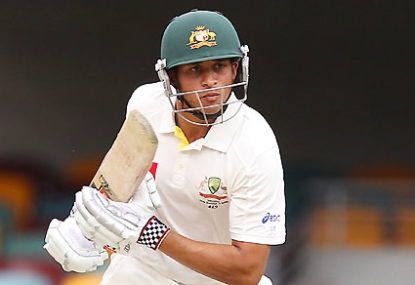With the release of Cricket Australia’s central contract list came the usual and proper dissection of its constituents. Most prominently, as their man was overlooked, the Usman Khawaja fan club were up in arms again.
These hardy souls, who sprung forth fully formed from the SCG turf two summers ago like Athena from the head of Zeus, see Australian cricket as nothing but an agonising series of insults design to besmirch the proud Khawaja name.
While few of his adherents take the trouble to spell it correctly, they have risen nonetheless in its defence on message boards across all fiefdoms of the electronic world.
The Roar’s usual suspects break from debating the GWS Giants’ median New South Wales regional free-to-air ratings versus the average attendance at Wellington Phoenix home games on cold days in November, instead speculating whether Ussie could have added 40,000 to the WA Foxtel numbers for Cronulla versus North Queensland if he’d strapped on his pads for the Sharkies.
There is apparently no sense that it may be a little unfair to expect a young man with one Test fifty and an average of 29 to be the saviour of a nation’s cricketing pride.
As many a cricketer has found in his career, the longer Khawaja is out of the game, the more popular he gets, and the more sure his fans become that his return is the only answer.
The bane of their lives is the evil selection panel, who if claims are to be believed are engaged in a cruel conspiracy to thwart Usman’s sporting dream.
Nobody has yet been able to explain why a selection panel that wanted to keep Khawaja out of Test cricket would keep picking him in Australian Test squads. Unless their plan was to keep him out of the Shield as well. The perfect crime!
In this context, his absence from the contract list was greeted by as yet another grievance by Khawaja fanciers, led in their chorus of dismayed dissent by our own David Lord as he tore blindly into the chairman of selectors.
Even more measured pundits questioned Khawaja’s absence, along with other potential Ashes tourists in Jackson Bird, Steve Smith, and Moises Henriques.
At the risk of offending Khawaiis everywhere, it would be useful if Usman’s fans did the slightest bit of research into the CA contract system before writing long denouncements of its application.
20 central contracts were issued this year, with three forms of the game to be catered for. But players outside that group are still up for selection, which can still earn them a contract by a mechanism called an upgrade.
Three Tests or six one-dayers are enough. Meaning if any of those players do get themselves in the Ashes side, they’ll soon enough earn their keep.
Last year this is exactly what happened with Ed Cowan, George Bailey, Phil Hughes, Aaron Finch, Clint McKay, the maligned Glenn Maxwell, and Henriques himself.
Bailey became T20 captain, McKay the ODI player of the year, Cowan a year-long Test opener, Hughes creamed two ODI centuries in his debut series, and the latter two all-rounders made thoroughly unexpected Test debuts.
Starting outside the contract list did none of those players any harm.
It simply made them prove they merited a contract before it was granted. That seems like a pretty good approach to me.
Khawaja’s omission from recent Tests is often called inexplicable. It isn’t. He has been positioned as the next batsman in since Ricky Ponting and Mike Hussey retired, but there hasn’t yet been a spot for him to take.
However pedantic his suspension before Mohali, Khawaja was the one who failed to tick all the boxes. Steve Smith seized the opportunity instead.
So why exactly shouldn’t Khawaja earn his contract by first earning and holding onto a Test place?
The same goes for Bird, certainly in my first-picked attack if he can recover from injury. If he can knock off three Tests, he gets a contract. If not, he doesn’t need one.
Neither Smith nor Henriques are genuine Ashes players. Smith was a horse for a course, who can’t be backed on a heavy English track.
Henriques is a bit-part player with an average record. Lamenting his absence from the list, as Lord did yesterday, is like complaining that there are no plastic forks in your silver service.
In fact, the only room for criticism in the contract list is in the number of inclusions, not the number of omissions.
Only David Hussey was a straight drop from last year’s core list, with Henriques and Finch missing out after upgrades. The retirements of Ponting and Mike Hussey threw out a couple of lifelines.
Ryan Harris is a mystery to me – as good as he reminded us he is in a fierce Sheffield Shield final, he’s famous for playing one Test at a time between injuries. If anyone were a candidate to earn a spot by matches paid, Harris is that man.
Patrick Cummins makes more sense, as CA wants full control of managing his injuries and training, which is far easier when you’re the one signing his pay slips. Presumably Cummins is on a lower retainer than active players.
Ben Hilfenhaus is also puzzling given his recent tumble down the Test pecking order. Mitchell Johnson has likewise fallen, but remains an impressive limited-overs player.
That’s still a factor. Those criticising the contracts of Xavier Doherty, McKay, James Faulkner or Maxwell seem to have forgotten that there’s an ODI and a T20 team to cater for as well.
If they do remember, I guess the burning question will become why Usman Khawaja isn’t opening the batting in both.





























































































